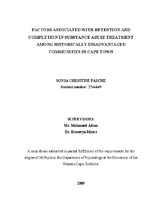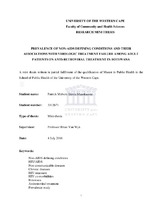| dc.description.abstract | Cape Town is suffering from high rates of alcohol and other drug (AOD) problems.
Despite the need for effective treatment, there are insufficient AOD treatment facilities available, with barriers to AOD treatment being particularly pronounced among historically disadvantaged communities (HDCs). In addition, the high drop-out rate of patients from AOD treatment, and the finding that retention in treatment is predictive of positive outcomes, increases the necessity of retaining people who enter AOD treatment.This study therefore aimed to identify those patient-level factors impacting on the successful completion of and retention in AOD treatment. In particular, the study aimed to describe the relationship between treatment process factors (therapeutic alliance,motivation, treatment satisfaction, social support), demographic and psychological variables, and treatment completion and retention. The Texas Christian University (TCU) Treatment Model, which conceptualises the AOD treatment process, provided the theoretical framework for the study. Using a quantitative design, secondary data analysis
was conducted on a section of data that was originally collected by the Medical Research Council (MRC) via a cross-sectional survey. The sample consisted of 434 individuals from HDCs who had previously entered AOD treatment. Multiple regression analyses revealed that the therapeutic alliance, treatment satisfaction, abstinence-specific social support and depression were significant predictors of treatment completion, while race,therapeutic alliance, abstinence-specific social support and anxiety were predictive of the time spent in treatment. These predictors were positively associated with treatment completion and time in treatment. Black Africans spent significantly less days in treatment than Coloured individuals, although both groups were equally likely to complete treatment. The results suggest that by strengthening the therapeutic alliance,social support and treatment satisfaction, treatment completion and retention can be improved. This can be achieved by training, ongoing monitoring of these factors during treatment, and greater involvement of supportive social networks in a patient’s recovery.
The findings also point towards the need for improved service delivery for Black
Africans, who confront many barriers to accessing inpatient AOD treatment. | en_US |




